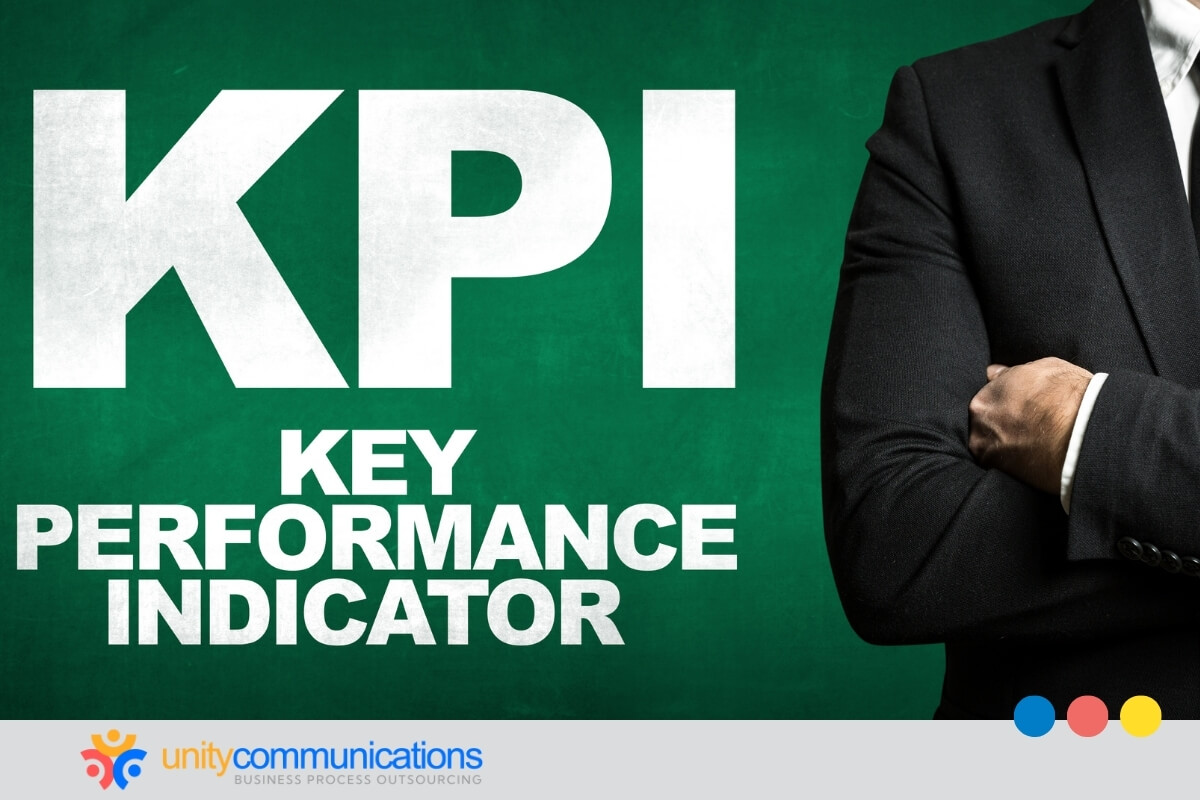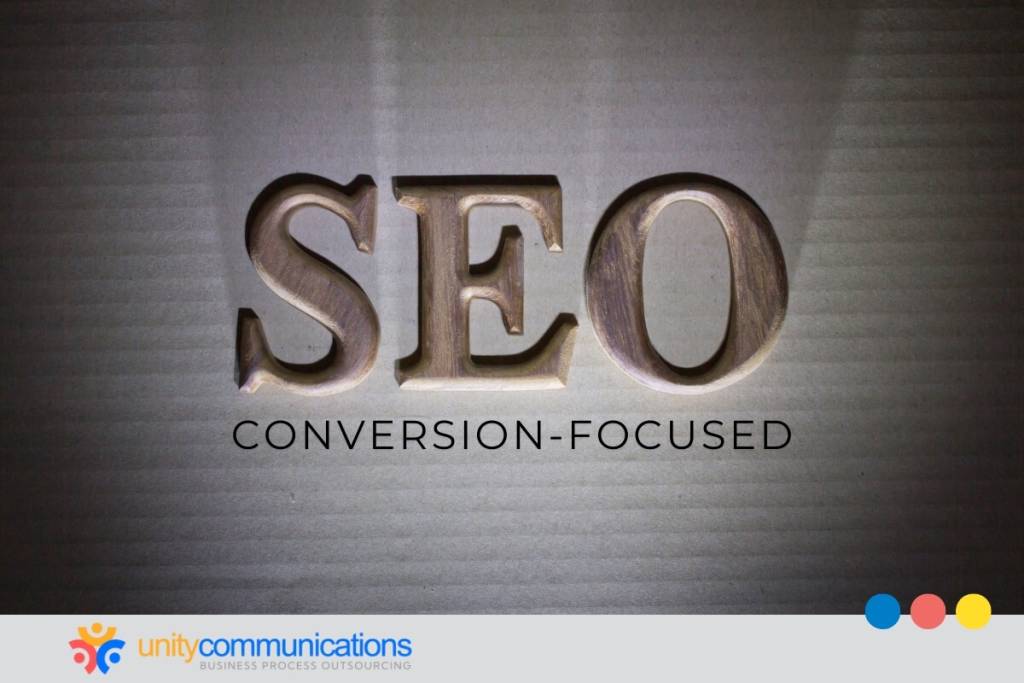IN THIS ARTICLE
Table of Contents
The overwhelming volume of online content, advertisements, and platforms competing for users’ attention makes standing out challenging today. However, visibility is just the start of the competition. To succeed, businesses must drive meaningful conversions, such as sales, subscriptions, and lasting customer loyalty.
A conversion-focused strategy aligns search engine optimization (SEO), content, and user experience (UX) to deliver measurable results. Businesses prioritizing conversions boost return on investment (ROI), build trust, and nurture customer relationships. How can they achieve them?
Business process outsourcing (BPO) is key. BPO providers craft SEO strategies that enhance visibility, analyze user behavior, optimize content, and improve site performance to deliver seamless experiences that convert.
Continue reading to learn how BPO for conversion-focused SEO can revolutionize your digital strategy and convert clicks into loyal customers!
Understanding conversions in business

In business, “conversion” is the process of turning leads into customers or encouraging them to take a desired action. Although the conversion specifics can vary by industry and business model, the concept is rooted in driving meaningful outcomes that align with a company’s goals.
Based on the latest reports, if your e-commerce website converts at 2%, you’re performing at an average level. Whether completing a purchase, signing up for a newsletter, or downloading a resource, conversions represent the critical actions that propel business growth.
Types of conversions
Conversions are not limited to sales. They encompass many actions depending on the business objective:
- Sales conversions: Turning a website visitor into a paying customer.
- Lead generation: Collecting information from potential customers through forms or sign-ups.
- Engagement: Encouraging actions such as downloading content, watching videos, or sharing posts.
- Retention conversions: Focusing on repeat purchases or re-engagement of existing customers.
Each type of conversion plays a role in building and sustaining a successful business.
Why conversions matter
Conversions are essential because they directly affect a business’s bottom line. They transform marketing efforts into tangible results, ensuring that investments in advertising, SEO, and content creation yield measurable returns.
In addition to revenue generation, conversions:
- Validate marketing strategies: High conversion rates indicate effective messaging, targeting, and UX.
- Enhance customer insights: Conversion tracking provides valuable data about customer behavior, preferences, and decision-making processes. Understanding why customers convert or abandon helps refine offerings to better meet their needs.
- Improve resource allocation: Conversion insights help prioritize efforts on channels, campaigns, and strategies that deliver the best results, reducing wasted resources.
- Strengthen brand credibility: Successful conversions build trust in your brand. Satisfied customers are more likely to recommend your products or services to others.
- Identify growth opportunities: Tracking conversion patterns can reveal untapped markets, customer segments, or product enhancements.
- Streamline sales processes: Insights from conversions help refine sales pipelines, accelerating closed deals.
Role of BPO in creating conversion-focused SEO strategies

BPO has revolutionized how companies approach SEO, particularly in crafting strategies that prioritize conversions. While traditional strategies focus on improving visibility, BPO for conversion-focused SEO prioritizes guiding users through the customer journey to drive meaningful actions.
Here’s what BPO providers can do to transform traffic into customer interactions:
Optimize website architecture for user-friendly navigation
One of the most critical aspects of conversion-focused SEO is a well-structured website. A clear, intuitive navigation page means visitors quickly find what they want. It significantly reduces bounce rates and increases the likelihood of conversion.
BPO providers excel at analyzing website structures, identifying pain points, and implementing improvements that align with user behavior and SEO best practices. They can create logical menu hierarchies, ensure mobile responsiveness, and reduce page load times.
By optimizing the architecture, BPO teams help businesses deliver a seamless user experience that encourages visitors to stay or engage longer with the site. A user-friendly layout improves usability and boosts rankings, as search engines prioritize sites with superior navigation and performance.
Research shows that 38% of first-time visitors judge a website’s page layout or navigational links, making user-friendly design essential for creating a positive impression. This translates to a double benefit for businesses: enhanced visibility and conversions.
Enhance content for targeted user intent
Content is the cornerstone of any effective SEO strategy, but not all content is created equal. Conversion-focused SEO requires copy that meets specific user intents, whether informational, transactional, or navigational.
BPO providers specialize in creating and optimizing content that resonates with target audiences. They use keyword research and customer data insights to craft messages that address their needs and pain points. From blog posts and landing pages to product descriptions, every content piece guides users toward action.
For instance, a BPO team working with an e-commerce clothing retailer might identify that users searching for “best winter jackets for extreme cold” have informational intent. They can craft an SEO-optimized blog post comparing top winter jackets while subtly directing readers to the retailer’s product pages.
BPO teams for conversion-focused SEO ensure content is search engine optimized, engaging, clear, and persuasive. By aligning content with user intent, businesses can foster trust, answer customer questions, and move prospects seamlessly through the sales funnel, driving higher conversion rates.
Craft compelling CTAs for better engagement
A strong call to action (CTA) is a critical component of conversion-focused SEO. It prompts users to take the next step, whether purchasing, signing up, or downloading a resource.
BPO providers bring expertise in crafting clear, concise, and compelling CTAs. By analyzing user behavior and testing various approaches, they create CTAs that align with customer expectations and drive meaningful engagement.
Effective CTAs go beyond “click here” or “learn more.” They communicate value and urgency, guiding users toward specific goals. For example, a BPO team might refine a CTA to say, “Download Your Free Guide Today” or “Get 20% Off When You Sign Up.”
By seamlessly integrating these CTAs into the website content and site design, BPO providers help businesses increase engagement and conversion rates.
A/B testing SEO elements to improve conversions
BPO providers conduct A/B tests to compare different versions of key SEO elements, such as headlines, CTAs, landing pages, and site layouts. This data-driven approach identifies which variations perform better, enabling businesses to refine their strategies for maximum impact.
For example, an A/B test might reveal that a specific headline drives more clicks or a particular CTA color encourages more sign-ups. BPO teams analyze these results and implement changes to enhance overall performance.
By leveraging A/B testing, businesses can make informed decisions and eliminate the guesswork. This BPO approach can continuously optimize digital strategies to drive higher conversions and ROI.
Utilizing BPO support for e-commerce SEO optimization

E-commerce businesses operate in an intensely competitive environment where visibility and conversions directly affect revenue. Leveraging BPO support for conversion-focused SEO optimization offers a strategic advantage. It allows e-commerce companies to improve search rankings, traffic, and UX.
Here’s how a BPO organization contributes to e-commerce SEO success:
- Comprehensively researching and targeting keywords: The BPO team identifies high-performing keywords, including long-tail terms that align with user intent (e.g., “affordable organic skincare for sensitive skin”). They integrate keywords into product descriptions, category pages, and blog posts to attract ready-to-buy customers.
- Optimizing product pages for conversions: BPO experts enhance meta tags, craft compelling product descriptions, and add high-quality images with SEO-friendly alt text. They also speed up loading times, design mobile-responsive pages, and use specific CTAs to improve UX and increase conversions.
- Building authoritative backlinks: The BPO team acquires credible backlinks through content marketing, blogger outreach, and collaborations with industry influencers. They boost domain authority to improve search rankings and foster customer trust.
- Tracking performance and refining strategies: BPO professionals monitor key performance indicators (KPIs) such as traffic, bounce rates, and conversion rates. They use data insights to refine SEO strategies, adapt to market trends, and maximize ROI.
By leveraging BPO support, e-commerce businesses can focus on their core operations while achieving SEO-driven growth, increased visibility, and higher conversions.
Tools BPO firms use for conversion-focused SEO
BPO providers use advanced tools, including cutting-edge artificial intelligence (AI) technologies, to craft and execute conversion-focused SEO strategies. They help analyze performance, optimize content, and enhance UX, paving the way for higher conversions.
Examples include the following:
- Keyword research and analytics tools: Google Keyword Planner identifies high-performing keywords based on search volume and competition. Semrush and Ahrefs provide insights into keyword rankings, competitor analysis, and content gaps.
- Content optimization tools: Grammarly and Hemingway Editor ensure clear, engaging, and error-free content. Surfer SEO aligns content with SEO best practices by analyzing on-page elements.
- Technical SEO tools: Google Search Console monitors site performance, identifies crawl errors, and highlights indexing issues. Screaming Frog performs website audits to detect broken links, duplicate content, and other technical problems.
- UX tools: Hotjar and Crazy Egg track user behavior through heatmaps and session recordings to identify friction points. PageSpeed Insights evaluates site load times and offers suggestions for improvement.
- A/B testing tools: Google Optimize compares variations of landing pages, headlines, and CTAs to determine what drives higher conversions. Optimizely enables testing of site elements to refine user experiences and maximize engagement.
- Backlink and domain authority tools: Moz Link Explorer analyzes backlink profiles and domain authority to identify link-building opportunities. BuzzStream manages outreach campaigns to acquire high-quality backlinks.
- Analytics and reporting tools: Google Analytics tracks visitor behavior, conversion rates, and traffic sources to measure SEO effectiveness. Data Studio creates detailed, customizable reports for ongoing performance tracking and strategy refinement.
As of 2024, 72% of businesses worldwide have adopted AI. AI in the BPO industry enables deeper data analysis, automation of routine tasks, and precise targeting so businesses can achieve measurable results. In SEO, BPO providers use AI-powered tools to help companies optimize workflows, improve efficiency, and stay ahead of the competition.
The bottom line
In today’s competitive market, businesses need more than just visibility. They require strategies that deliver measurable results. Partnering with BPO providers gives companies access to expertise and tools that turn clicks into meaningful customer actions.
From optimizing website design to creating tailored content and leveraging AI for data-driven decisions, BPO support ensures efficiency and a focus on what matters most: conversions.
Outsourcing SEO tasks allows businesses to concentrate on their core operations while specialists handle the complexities of driving growth online. Whether you aim to boost sales, generate leads, or build stronger customer relationships, BPO provides the strategic edge you need.
Ready to take the next step? Let’s connect and explore how we can help you achieve your business goals.





